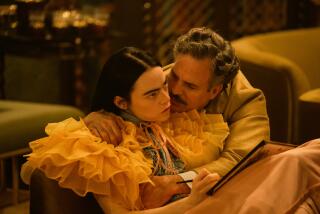Review: Netflix’s ‘The Guernsey Literary and Potato Peel Pie Society’ is a pleasant throwback romance with a sparkling Lily James
- Share via
“The Guernsey Literary and Potato Peel Pie Society” is an old-school, old-fashioned entertainment, a romantic drama bursting with scenic vistas and earnest charm that contains just enough mystery to keep us involved.
In fact, as efficiently directed by the veteran Mike Newell (“Four Weddings and a Funeral,” “Enchanted April”), this is just the kind of satisfying mainstream diversion that people used to leave their homes and go out to the movies for. Until now.
For though “Guernsey” has played quite successfully theatrically in Britain, France and other countries, in the U.S. Netflix acquired the distribution rights, and not even a token theatrical release in Los Angeles is in the works at the moment.
There is one sense, however, where “Guernsey,” adapted from the Mary Ann Shaffer and Annie Barrows’ bestselling novel by Thomas Bezucha, Kevin Hood and Don Roos, will look pleasantly familiar on home screens, and that is its cast.
No less than four actors, starting with star Lily James and including Jessica Brown Findlay, Matthew Goode and Penelope Wilton, had roles on PBS’ splendid “Downton Abbey” series.
James, fresh off facing off against Gary Oldman as Winston Churchill in “Darkest Hour” and playing a young Meryl Streep in “Mamma Mia! Here We Go Again,” is the undisputed star here, though brooding Dutch actor Michiel Huisman (“Game of Thrones”) gives her a run for her money as one of the most killingly handsome pig farmers in cinema history.
Though the film doesn’t let on, it’s helpful to know going in that the island of Guernsey, though officially a self-governing dependency of the British crown, is geographically closer to France than to Britain, which is why it was occupied by German troops during World War II, a key plot element.
James plays London writer Juliet Ashton, a sprightly young woman introduced in 1946, just after the war has ended, riding a bus with her handsome publisher Sidney Stark (Goode).
Ashton has just published a book, “Izzy Bickerstaff Goes to War,” written in that male character’s voice, and, eager to take on something in her own, she’s pleased but nervous when Stark tells her about an essay assignment from the London Times about the importance of reading.
Though there is tragedy in her background (her parents were killed during the Blitz), Ashton is determined to enjoy herself, and we see her dancing up a storm with a serious beau, wealthy, commanding American officer Mark Reynolds (Glen Powell).
One fateful day Ashton gets a letter from Guernsey. It’s from Dawsey Adams, that knockout handsome pig farmer, who has come across her name and address in a used book.
He introduces himself as a founding member of that Guernsey society, a book club actually, and innocently wonders if she could guide him to some other books. Because audiences have already seen what a Heathcliff look-alike Adams is, we know where this story is going well before the characters themselves.
The original “Guernsey” novel is an epistolary one, and the letters these two exchange are some of the film’s best moments.
We learn how the society was formed and how it got its odd name during that World War II occupation, and we meet its key members, including feisty guiding light Elizabeth McKenna (Brown Findlay), cantankerous postmaster Eben Ramsey (the veteran Tom Courtenay), reserved Amelia Maugery (Wilton) and eccentric Isola Pribby (Katherine Parkinson).
Intrigued by the story of how much books meant to this isolated community, how reading kept everyone sane during the war, Ashton decides these folks would make the perfect subject for that Times article and, protestations from beau Mark notwithstanding, determines to pop over to the island for a brief visit and get the story.
But while the folks on Guernsey are charmed that “a real writer has come to see us” and even offer to bake her a genuine potato peel pie (“It’s the worst,” Eben Ramsey admits), Ashton soon discovers that things there are not as unapologetically bucolic as she had imagined.
For one thing, key player Elizabeth is mysteriously off-island and no one can say when she might return. And for another, the residents are unexpectedly reticent about sharing their story and are not eager to be written about at all.
Long story short, to Ashton’s surprise but not to ours, the history of what happened on Guernsey during the Occupation turns out to be more complex than anticipated, presenting secrets to be discovered and depths to be plumbed.
Though logistical difficulties kept it from shooting on the island itself, “Guernsey’s” look (courtesy of cinematographer Zac Nicholson) is always first rate, and though her character can be a little too invasive at times, James effortlessly holds the story together.
“Guernsey” may not qualify as demanding cinema but it is eminently satisfying, and if in the final analysis it must be seen on home screens, that is preferable to no screens at all.
------------
‘The Guernsey Literary and Potato Peel Pie Society’
Not rated
Running time: 2 hours, 4 minutes
Playing: Streaming on Netflix
More to Read
Only good movies
Get the Indie Focus newsletter, Mark Olsen's weekly guide to the world of cinema.
You may occasionally receive promotional content from the Los Angeles Times.











